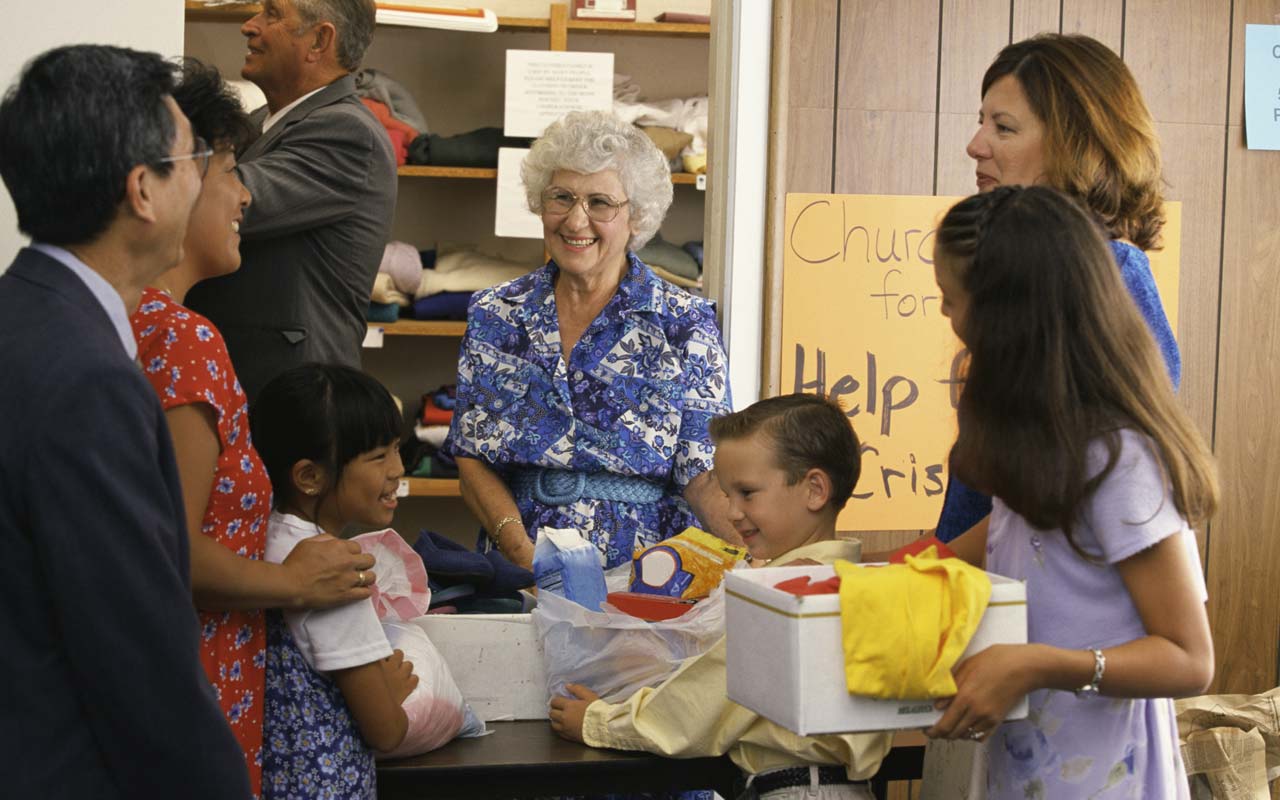10 Things Every Kid Should Know About Money by Age 18
Families still seem to be struggling with how to help their children learn to manage money.


Profit and prosper with the best of Kiplinger's advice on investing, taxes, retirement, personal finance and much more. Delivered daily. Enter your email in the box and click Sign Me Up.
You are now subscribed
Your newsletter sign-up was successful
Want to add more newsletters?

Delivered daily
Kiplinger Today
Profit and prosper with the best of Kiplinger's advice on investing, taxes, retirement, personal finance and much more delivered daily. Smart money moves start here.

Sent five days a week
Kiplinger A Step Ahead
Get practical help to make better financial decisions in your everyday life, from spending to savings on top deals.

Delivered daily
Kiplinger Closing Bell
Get today's biggest financial and investing headlines delivered to your inbox every day the U.S. stock market is open.

Sent twice a week
Kiplinger Adviser Intel
Financial pros across the country share best practices and fresh tactics to preserve and grow your wealth.

Delivered weekly
Kiplinger Tax Tips
Trim your federal and state tax bills with practical tax-planning and tax-cutting strategies.

Sent twice a week
Kiplinger Retirement Tips
Your twice-a-week guide to planning and enjoying a financially secure and richly rewarding retirement

Sent bimonthly.
Kiplinger Adviser Angle
Insights for advisers, wealth managers and other financial professionals.

Sent twice a week
Kiplinger Investing Weekly
Your twice-a-week roundup of promising stocks, funds, companies and industries you should consider, ones you should avoid, and why.

Sent weekly for six weeks
Kiplinger Invest for Retirement
Your step-by-step six-part series on how to invest for retirement, from devising a successful strategy to exactly which investments to choose.
Families still seem to be struggling with how to help their children learn to manage money. One indication is that parents can't keep from indulging their kids. In the 2016 Parents, Kids & Money survey from T. Rowe Price, 46% of parents said they have gone into debt to pay for something their kids wanted. Birthdays come with big price tags: 41% of parents spent $200 or more on a child’s birthday presents in the preceding 12 months, and the same percentage spent $200 or more on the child's birthday party. Among kids, 57% agree with the statement, "I expect my parents to buy me what I want." And not surprisingly, 58% of parents agree with the statement, "I worry that I spoil my kids."
Furthermore, 71% of parents are reluctant to talk with kids about money. When asked how often they take advantage of opportunities that occur throughout the day to talk to their kids about financial topics, less than half said they do so most of the time.
To jump-start the conversation during Financial Literacy Month, here's my list of 10 things every kid should know about money by age 18, with painless ways to get the job done.

1. How to Save for a Goal
Start simple and start small, with a fun savings bank that's as much a toy as it is a teaching tool for preschoolers. It's tough for anyone to save for the future, especially young children with short time horizons. For example, don't expect your 6-year-old to grasp why it's important to save for something as abstract as college. But she can learn to put aside her coins to buy a toy or collectible. To make the goal even easier to grasp, attach a photo of the coveted item to the savings bank and watch the money add up.
When children move into elementary and middle school, help them open a bank savings account. And the goal could be something bigger: a new tennis racket or soccer shoes, or a school field trip. Unfortunately, today's piddling interest rates don't give children much in the way of rewards. But you can help remedy that by offering to match their savings.
Once kids reach high school, college becomes a real goal that's right around the corner. It's fine to require them to save a portion of their earnings from a part-time or summer job to cover college costs. Every dollar saved is a dollar they don't have to borrow.
- SEE ALSO: 8 Rules for Raising Money Smart Kids

2. How to Manage an Allowance
Kids will spend an unlimited amount of money as long as it's yours. When their money is on the line, it's a whole new ball game. Start an allowance around age 6 with a weekly amount equal to half your child's age. You can increase it as your child gets older and your expectations change with regard to what he or she should pay for.
My advice: Don't tie the allowance to basic household chores that kids should be expected to do without pay, such as doing the dishes and making their beds. Instead, tie it to financial chores: spending (and saving) responsibilities that the kids take over from you. You could start by having them pay for their own collectibles, for example, or treats at the grocery store, and expand their responsibilities as they get older to cover entertainment, clothing, even part of the cell-phone bill.
To make the connection between work and pay, let children earn more by doing extra jobs -- such as vacuuming, raking leaves, taking out the trash or whatever you define as service above and beyond.

3. They Won't Get Everything They Ask for
Next to "I love you," the most important words you can say to your kids are "No, you can't have that, and here's why." Part of the fun of being a parent is buying things for your children, but say yes too often and you’ll create spoiled kids who grow up feeling entitled.
The key to saying no and making it stick is to tell your children why you're denying a request and offer an alternative if possible. Unless you give them a rationale, kids will be tempted to chip away at your resolve and hope that you'll eventually cave.
So, for example, if your 8-year-old wants a skateboard and you think it would be too dangerous to own one in your urban neighborhood, say so. If your 13-year-old wants a new video-game system and you think his existing one is adequate, say so. Better yet, tell him he'll have to spend his own money if he wants to replace it. Once kids have their own resources -- from gifts, allowance or earnings -- make it clear in advance which purchases are on their own dime.

4. How to Spend Smart
Learning how to spend money is just as important as learning how to save it. Preschoolers can use coins from their piggy banks to buy things from vending machines or at the dollar store. You've accomplished a lot if you teach very young children that money can be exchanged for other things.
For older kids, websites and shopping apps make it easy to compare prices on everything from video games to prom gowns. But don't ignore the old standbys: Board games such as Monopoly, Payday and The Game of Life teach kids how to parcel out their money. And nothing beats a real-life trip to the grocery store to compare prices and find the best buys (let the kids keep savings they spot).
As a parent, you can always put some limits on what they buy -- nothing illegal or unhealthy -- but, for the most part, let kids make their own spending choices.
- Children also need to know that they have rights as consumers. If your daughter buys an item that breaks, doesn't fit or is otherwise unsatisfactory, take her back to the store so she can return the item and get her money back.

5. How to Be Generous
Remember that charity involves gifts of time -- and thoughtfulness -- as well as money. Parents are the prime role models here, so children will learn invaluable lessons if you volunteer to shovel snow for an elderly neighbor, make a meal for new parents or bake cookies for a charity bake sale -- and have the kids pitch in.
When it comes to donating money or things, the more personal, the better. Don't just send off a check to your place of worship or favorite charity. Talk with your children about what you're doing and why you chose to aid that cause. Have the kids pack up clothes they've outgrown or toys they no longer play with and come along with you to donate them to a family shelter. Or they can use their own money to buy a toy for a holiday gift drive.
Designate a special container for found money that kids pick up under the sofa cushions or fish out of their jeans pockets. When the jar fills up, they can give the money to a charity or cause of their choosing. Or be more systematic and have them put aside 10% of their allowance to donate as they wish.

6. How to Earn a Buck
- Kids' first experience with their role in the labor market is the extra chores they do around the house. As they move into middle school, they can expand their horizons by doing work in the neighborhood, such as babysitting, lawn mowing or computer coaching, or even formalizing their skills in a business of their own.
Their first encounter with a salaried job is likely to be in their teens, working part-time or at a summer gig. Studies show, however, that labor force participation among teens has been declining as more young people spend their time in summer school, at camp or engaged in other activities.
But teens who don't hold down paid jobs are missing out on valuable life lessons. Showing up on time, taking responsibility and getting along with coworkers and supervisors are all critical skills -- and so is knowing how to find a job in the first place. Social media and online job sites are a great place to start. But even today, nothing beats making personal contact with a prospective employer.
Earning a paycheck also gives teens opportunities to manage money. They'll learn, for example, that tax withholding applies even to 16-year-olds. And they can get a head start on retirement savings by contributing to a Roth IRA up to the amount of their annual earnings, with a maximum of $5,500 in 2016.

7. How Fast Money Grows
- One trick every kid should learn is the magic of compound interest: Small amounts saved when you’re young eventually grow into big piles of money.
- SEE ALSO: When Your Kids Ask How Much Money You Make
To show kids how rich they can be, let them plug numbers into a compounding calculator, such as the one at MoneyChimp.com.
Another money trick is the "Rule of 72": 72 divided by the interest rate equals the number of years it will take your money to double.

8. What It Means to Invest
Don't assume that starting a stock portfolio is for adults only, sort of like an R-rated movie. On the contrary, buying stocks is more like a PG-13 activity. Children who are that age or even younger are able to understand how the market works, as long as you stick to the basics.
Just explain to kids that owning a share of stock is like owning a piece of a company whose goods they purchase or whose stores they patronize. Avoid the jargon. Their eyes will glaze over fast if you drone on about diversification, asset allocation or market capitalization. They're more likely to ask, "How can I buy a stock?" "Who is this Dow Jones person?" "What's the Fortune 500?"
- Buy them stock in a favorite company (or help them invest on their own) so they can follow news about the company and changes in its share price.
SEE ALSO: 17 Stocks Your Kids Will Love

9. How to Balance a Checking Account
- Every teenager should have a checking account (with an ATM or debit card) and know how to balance it, preferably as soon as he or she gets a part-time job. Cosign for a custodial account if your child is under 18 and the bank requires it.
- SEE ALSO: How to Help Your Adult Kids Save Money
The cashless society may be a techie's dream, but even for older teens nothing beats the hands-on experience of managing real cash -- via a website, an app or a paper check register -- and making the income match the outgo. That's the foundation for all future financial transactions, whether it's getting a credit card, setting up a budget or buying a house.
Money Matters on Campus, a survey of nearly 90,000 college students by education technology companies EverFi and Higher One, found that managing actual money had positive effects on the financial knowledge and behavior of college students. "Young adults should be provided with opportunities to gain financial experience managing a bank account, ideally before college," the report concluded.

10. How to Stay Out of Debt
Teens need to know that plastic is not cash. Rather, using a credit card is taking a loan that you have to repay with interest if you don’t pay off the entire amount each month.
Use this eye-opening example to illustrate your point: Say you put $25 a month toward a $2,000 balance on a credit card that charges 13% interest. It will take you 181 months to pay off the balance -- and cost $2,519 in interest (use MoneyChimp.com's credit card payoff calculator to try out different number combinations). If teens understand that, they'll be well on their way toward approaching debt with caution.
It's often recommended that teens be made authorized users on a parent's credit card. I disagree. I'm not against credit cards, but I think teenagers in general aren't mature enough to handle them. And kids won't learn personal responsibility as long as parents are paying the bills.
Once young people have experience covering their expenses without overdrawing their checking accounts (say, by paying the rent on their apartment in college), they can consider applying for a credit card -- preferably when they're 21 and can do it on their own.
Profit and prosper with the best of Kiplinger's advice on investing, taxes, retirement, personal finance and much more. Delivered daily. Enter your email in the box and click Sign Me Up.

Janet Bodnar is editor-at-large of Kiplinger's Personal Finance, a position she assumed after retiring as editor of the magazine after eight years at the helm. She is a nationally recognized expert on the subjects of women and money, children's and family finances, and financial literacy. She is the author of two books, Money Smart Women and Raising Money Smart Kids. As editor-at-large, she writes two popular columns for Kiplinger, "Money Smart Women" and "Living in Retirement." Bodnar is a graduate of St. Bonaventure University and is a member of its Board of Trustees. She received her master's degree from Columbia University, where she was also a Knight-Bagehot Fellow in Business and Economics Journalism.
-
 Dow Adds 1,206 Points to Top 50,000: Stock Market Today
Dow Adds 1,206 Points to Top 50,000: Stock Market TodayThe S&P 500 and Nasdaq also had strong finishes to a volatile week, with beaten-down tech stocks outperforming.
-
 Ask the Tax Editor: Federal Income Tax Deductions
Ask the Tax Editor: Federal Income Tax DeductionsAsk the Editor In this week's Ask the Editor Q&A, Joy Taylor answers questions on federal income tax deductions
-
 States With No-Fault Car Insurance Laws (and How No-Fault Car Insurance Works)
States With No-Fault Car Insurance Laws (and How No-Fault Car Insurance Works)A breakdown of the confusing rules around no-fault car insurance in every state where it exists.
-
 What to Do With Your Tax Refund: 6 Ways to Bring Growth
What to Do With Your Tax Refund: 6 Ways to Bring GrowthUse your 2024 tax refund to boost short-term or long-term financial goals by putting it in one of these six places.
-
 What Does Medicare Not Cover? Eight Things You Should Know
What Does Medicare Not Cover? Eight Things You Should KnowMedicare Part A and Part B leave gaps in your healthcare coverage. But Medicare Advantage has problems, too.
-
 15 Reasons You'll Regret an RV in Retirement
15 Reasons You'll Regret an RV in RetirementMaking Your Money Last Here's why you might regret an RV in retirement. RV-savvy retirees talk about the downsides of spending retirement in a motorhome, travel trailer, fifth wheel, or other recreational vehicle.
-
 The Six Best Places to Retire in New England
The Six Best Places to Retire in New Englandplaces to live Thinking about a move to New England for retirement? Here are the best places to land for quality of life, affordability and other criteria.
-
 The 10 Cheapest Countries to Visit
The 10 Cheapest Countries to VisitWe find the 10 cheapest countries to visit around the world. Forget inflation and set your sights on your next vacation.
-
 15 Ways to Prepare Your Home for Winter
15 Ways to Prepare Your Home for Winterhome There are many ways to prepare your home for winter, which will help keep you safe and warm and save on housing and utility costs.
-
 Six Steps to Get Lower Car Insurance Rates
Six Steps to Get Lower Car Insurance Ratesinsurance Shopping around for auto insurance may not be your idea of fun, but comparing prices for a new policy every few years — or even more often — can pay off big.
-
 How to Increase Credit Scores — Fast
How to Increase Credit Scores — FastHow to increase credit scores quickly, starting with paying down your credit card debt.
